The Redditch operation assembles six models of 4- and 5-axis machining centre and also delivers turnkey solutions in partnership with, for example, external workholding and cutting tool companies. It delivers internationally to many 10s of countries. Just like many other manufacturing companies, while Heller Machine Tools is still operating it does so at a reduced level of activity, due to a combination of suppressed demand and stringent internal working procedures.
The company has adopted safe working practices in its offices and shopfloor environment, having evolved these itself. “Unfortunately, there is no guidebook available,” Meyer offers wryly. Looking back, he says that the worst day was the day after the Prime Minister’s Monday, 23 March ‘stay at home’ message. “On the Monday night, it was announced that manufacturing could still be open and most of our employees turned up the next day at work. But then, I think it was 11 am when suddenly the text message from the government came in - stay home, save lives, protect the NHS. I wouldn't say our employees were panicking, but you could actually see the social distancing queue in front of our HR office getting longer. I needed to make a decision because if everybody - and we were probably at that point more than 100 people here at work - had acted on that message, we could have had chaos. So, within 15 minutes, I decided to close the company temporarily. While the message was that manufacturing operations could continue, adopting social distancing, I thought I couldn’t risk losing the trust of our employees.”
So the company was closed for one-and-a-half days, with a team then put together on Wednesday, 25 March to generate a plan that would support continuing operations. “I couldn't just say ‘close the factory’, because that would have exposed the company to commercial risk, because if you are not told by the government to close the facility, force majeure does not really apply and in any case we would have needed to balance it with fulfilling our contractual obligations to customers.”
Communications with employees, a safe working environment for them and meeting the business needs of the company were the three key things in the mix, and remain so, Meyer reports. He explains how the firm has organised itself to continue operations, albeit at about 50% of the previous level of activity and with a similar proportion of staff furloughed.
A couple of years ago, the company remodelled its offices to create an open plan layout that has proved beneficial in current circumstances. “We introduced home office working, wherever we could, so we've got about 80% of office staff working remotely. The remaining people in the offices have a lot of space, so social distancing is not an issue.
“As for the shopfloor, we have 6,000 square metres and we don’t have a lot of people at the same time working at a machine, so staff can keep social distancing there as well. One of the challenges was obviously to filter people in and out of work. To address this, we changed our working pattern. Every employee has a 15-minute slot between 6 am and 8 am when they can arrive. So, having created 16 slots, it means for example that in the changing room you don't have a queue of people standing there. In addition, we encourage people to arrive already wearing their work clothes and not to change here.
“I think we are fortunate that all our hand-washing facilities are touchless, so you don't need to touch a handle or open and close taps.”
A CHANGING LANDSCAPE
Having set out some standard operating procedures, Meyer recognised that these are not static. He adds, “Not every day, but at least two to three times a week, from our experience so far, our health and safety officer says, ‘Matthias I think we need to look at this’. So we adapt where we need to. This is a situation that nobody has seen before and the thing that is most important is communication with employees. This is sometimes difficult, because I may say something and then, maybe in two days, I'll say something totally different. I must praise our workforce. Everyone was obviously nervous, but on the other hand they are being very understanding of the situation and we are cooperating well. They see and appreciate that we inform them all the time about what we are doing and why we are doing it.”
As regards handling of metal parts (the virus can live for several hours on them) and shopfloor work, Heller Machine Tools’ managing director says: “All the material that is delivered here is usually not touched for a long time, because it comes in on a forklift and is unloaded, but if incoming metal or other goods are handled, operatives wear protective gloves. Material storage is not really a manual process. As for assembly, a machine build station does not have many people working together. Just two staff are needed to assemble a part on a machine, so there’s no constant changing backwards and forwards.”
Other specifics are the canteen, where tables are 2 m apart; doors that might normally be closed are wedged open to avoid frequent handle touching; an almost complete restriction on external visitors, but where they are necessary for maintenance purposes, then temperature checks are made; signage (English and German) to advise visitors of rules; full face visor for first aider use available; antibacterial gel stations; and there’s obviously self-reporting by employees, should they feel unwell.
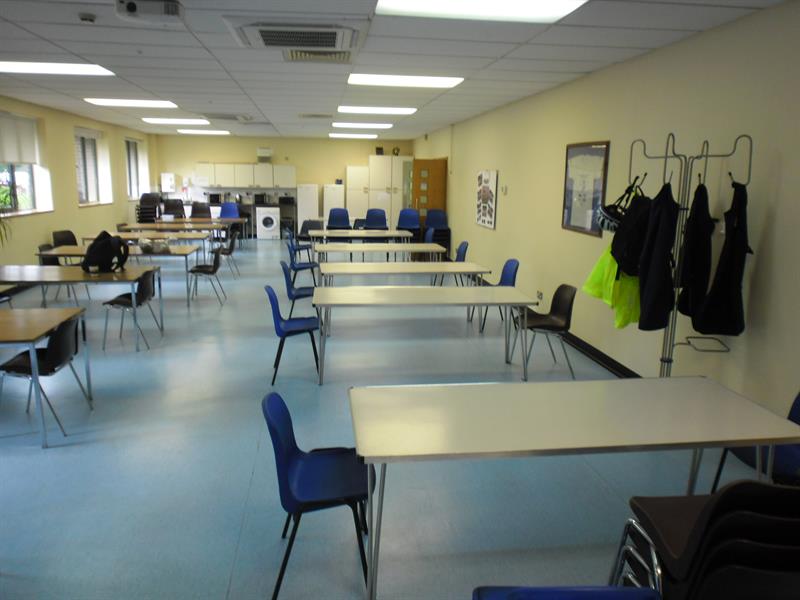
The works canteen; tables and chairs are widely spaced, in accordance with official guidance - more images at end of article
The company’s health and safety manager, Owen Needles, has documented procedures in detail, which are adapted more or less weekly, with this manual effectively detailing the whole history of what has been implemented and updated during the Covid-19 outbreak.
Machine tool servicing continues, the company having service engineers mainly based in the Midlands but also located around the country, and spare parts are available as normal. But there are conditions that must be satisfied. Meyer again: “Our service engineers and we need to be reassured of the conditions on a customer's site and we don't want them to stay away overnight, for example. Neither will we have them sitting in a car for hours. So you need to find a solution for customers that are further away, although being located in the heart of The Midlands it's easier for us to cope.” Service engineers are provided with necessary PPE, in addition.
Remote service, in the sense of actually talking people through the process, has been a way around the location issue. “In one instance I recall, it took a bit longer, to be sure, but the customer at the end of the day was delighted. It paid off for him on this occasion because he had invested in training his staff, which is not always the case.”
On the matter of furlough, as a German national, Heller Machine Tools’ managing director is well acquainted with the German system of Kurzarbeit, the country’s existing scheme of about a century’s standing that provides for partial compensation for a worker’s earnings in times of challenge. Kurzarbeit is said to have allowed Germany to hold its unemployment rate to within 7.5% during the recession following the 2008-2009 economic crisis, for example.
Says Meyer: “I'm grateful that the government has done something for the first time. Is it all perfect? No. Could it be quicker? Yes. But you know, if somebody had told me eight weeks ago that there would be this furlough scheme available, I wouldn't have believed it. In Britain, nothing like this has been done before.
SUPPORTED FLEXIBILITY AIDS RECOVERY
“I have to say I've shouted about this Kurzarbeit system for years. When you go into a recession and we are laying people off, making them redundant, your recovery time is much, much longer, especially in manufacturing. Each time, if you're not able to maintain and retain your workforce, your ramp-up will be slower. Technology moves on, you lose people and the more people you lose, the longer it takes to start up again. And that can’t be efficient for a state, either, because the longer it takes to ramp up, the longer it takes for the government to regain the same level of tax income. So, this kind of furlough is an instrument that I think an economy needs and it is really helpful. It may not be perfect, but sometimes I think we need to show a bit of patience as well.”
An issue that will arise with the current system, suggests Meyer, is the ‘all or nothing’ nature that says a worker is either 100% not working or 100% working, nothing in between. That is key for a manufacturing company like Heller Machine Tools, where work, when it returns, will come back in a progressive fashion. “In a lot of cases, you have reduced workload because of a supply chain or delivery issue. You can’t really send someone with particular skills home for three weeks, because you may need those skills for two days a week and then the next week you may need them for three days, and so on. The current furlough system does not allow for such flexibility.”
As to when the economy and business should return to a more normal state, he simply points to those countries that are beginning to open up and says: “What signs did they see in Germany, Italy and Spain during the lockdown? You come to a point where you get to zero [no new cases], but by then I think it is too late for the economy.” So, just as within a factory, it is a matter of risk management; zero risk is not achievable.
(A full explanation of the German system and latest modifications to this can be found here).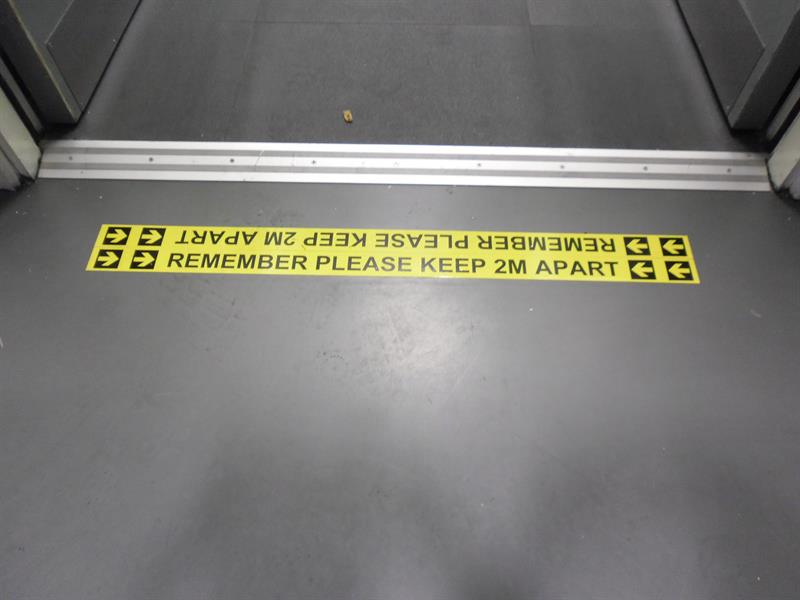
A reminder about distancing
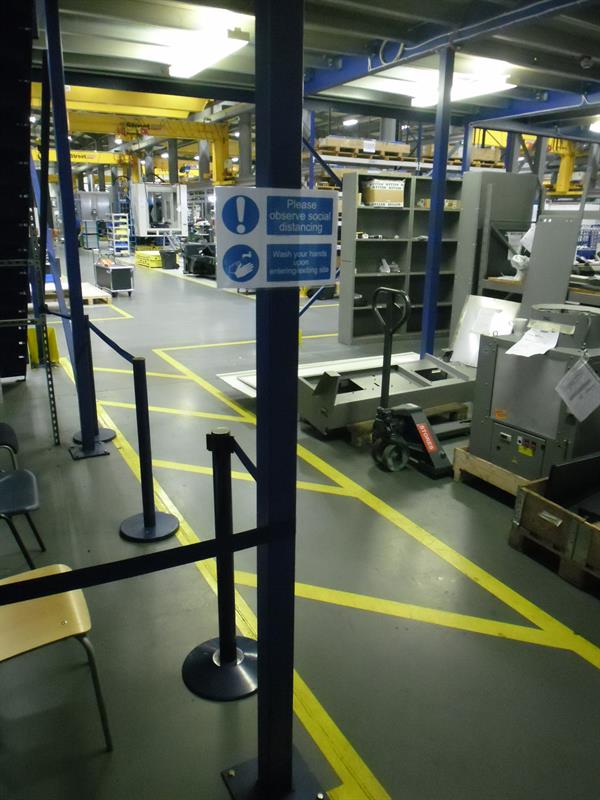
Marking, boundaries and signage
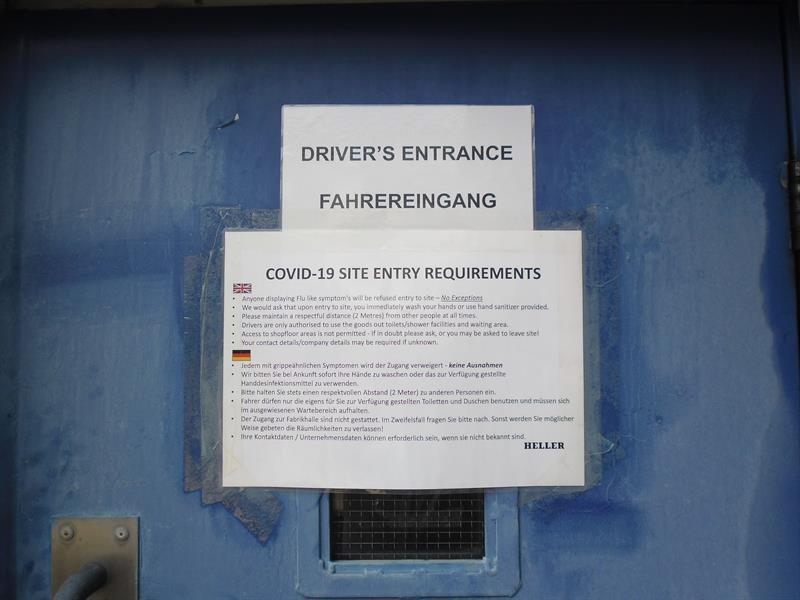
Dual language advice for outside visitors, delivery drivers in this instance
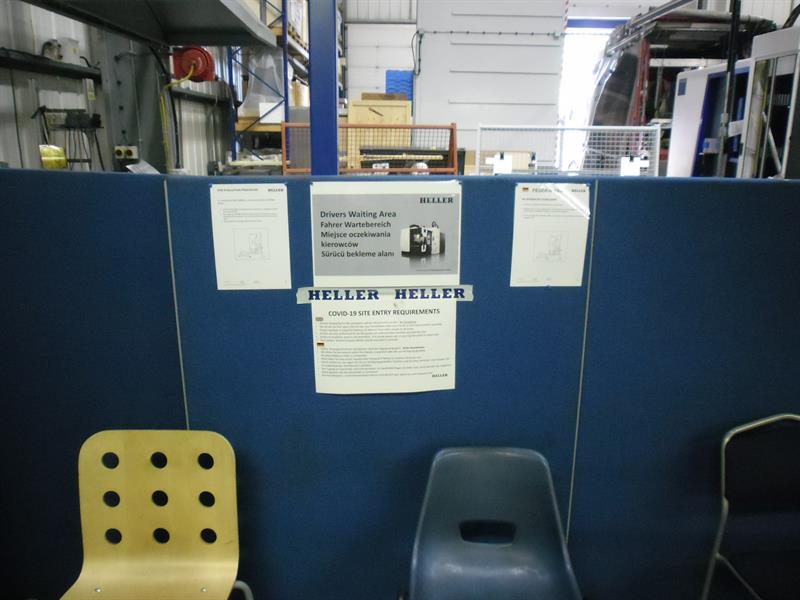
Drivers' waiting area










